Key takeaways
- Formative feedback enhances student learning by promoting ongoing dialogue and reflection, allowing for deeper understanding and confidence building.
- Assessments in philosophy should prioritize clarity of thought and reasoning over rote memorization, fostering an environment that values diverse perspectives.
- Implementing regular, specific, and actionable feedback transforms classroom dynamics, making learning collaborative rather than punitive.
- Continuous improvement in assessment practices involves gathering student input and reflecting on feedback effectiveness to better support philosophical growth.
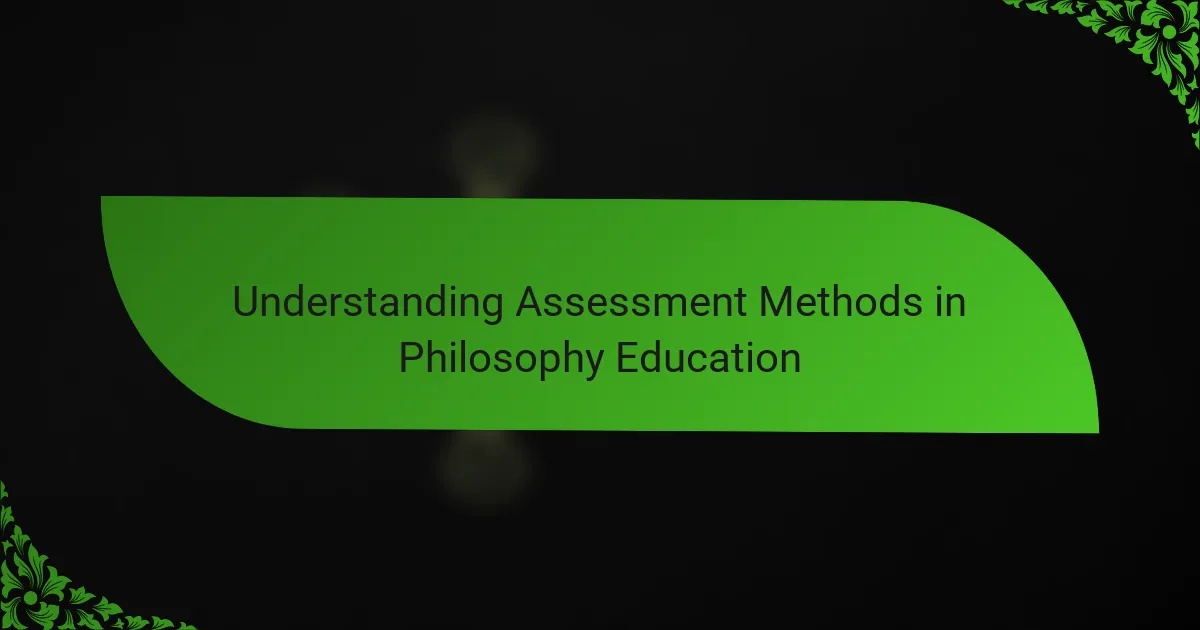
Understanding Assessment Methods in Philosophy Education
When I first started teaching philosophy, I quickly realized that assessing students in this field is uniquely challenging. Unlike subjects with clear-cut answers, philosophy invites diverse interpretations, making traditional testing methods less effective. Have you ever wondered how to truly measure a student’s critical thinking rather than just their memorization skills?
In philosophy education, assessment methods like formative feedback play a crucial role. I’ve found that ongoing, constructive feedback helps students refine their arguments and deepen their understanding, which a single exam just can’t capture. This approach not only encourages continuous learning but also builds confidence, as students see their progress unfold over time.
Understanding these methods means recognizing that assessment is not just about grading but about dialogue. From my experience, the best assessments prompt students to question their own beliefs and engage actively with philosophical ideas. Isn’t that the heart of philosophy itself?
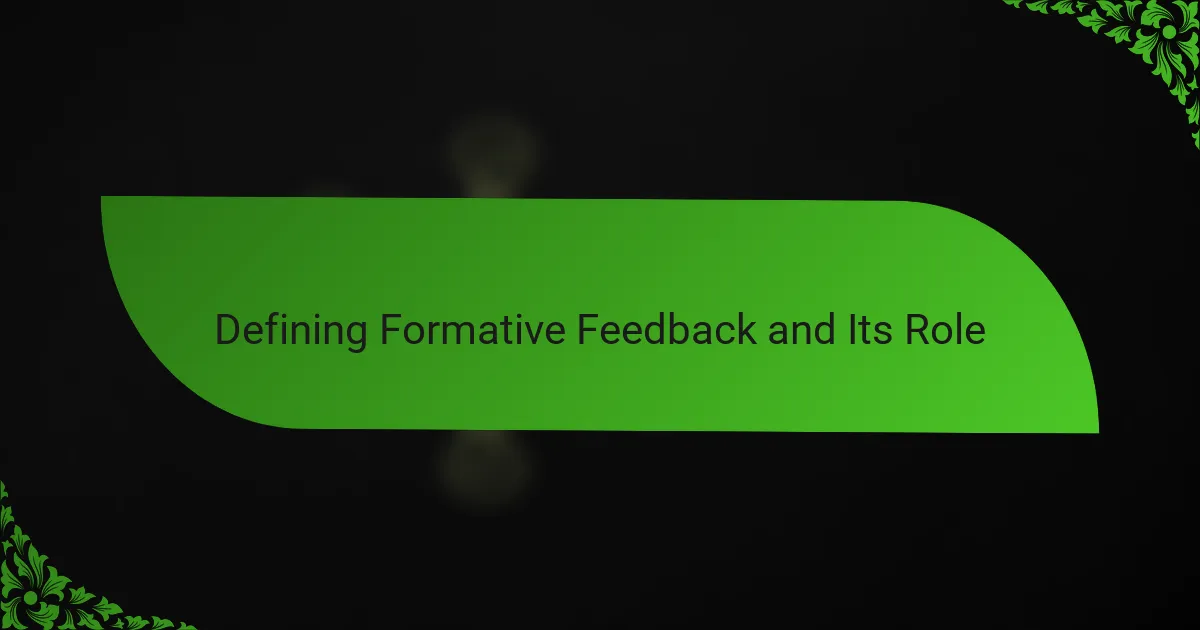
Defining Formative Feedback and Its Role
Formative feedback, to me, is more than just comments on a paper—it’s an ongoing conversation between teacher and student. I’ve seen firsthand how timely, specific feedback can spark those “aha” moments when a student suddenly grasps a complex philosophical idea. Isn’t it powerful when learning feels like a shared journey rather than a one-way evaluation?
This type of feedback serves a unique role: it guides students through their thinking process instead of merely judging the final product. I often remind myself that philosophy isn’t about getting the “right” answer, but about shaping reasoning and clarity. Formative feedback helps cultivate this mindset by encouraging reflection and revision along the way.
In practice, I’ve noticed that formative feedback transforms classrooms into spaces where mistakes become opportunities for growth. When students feel safe to explore and adjust their views, their engagement and confidence soar. Isn’t that exactly what philosophy education should aim for?
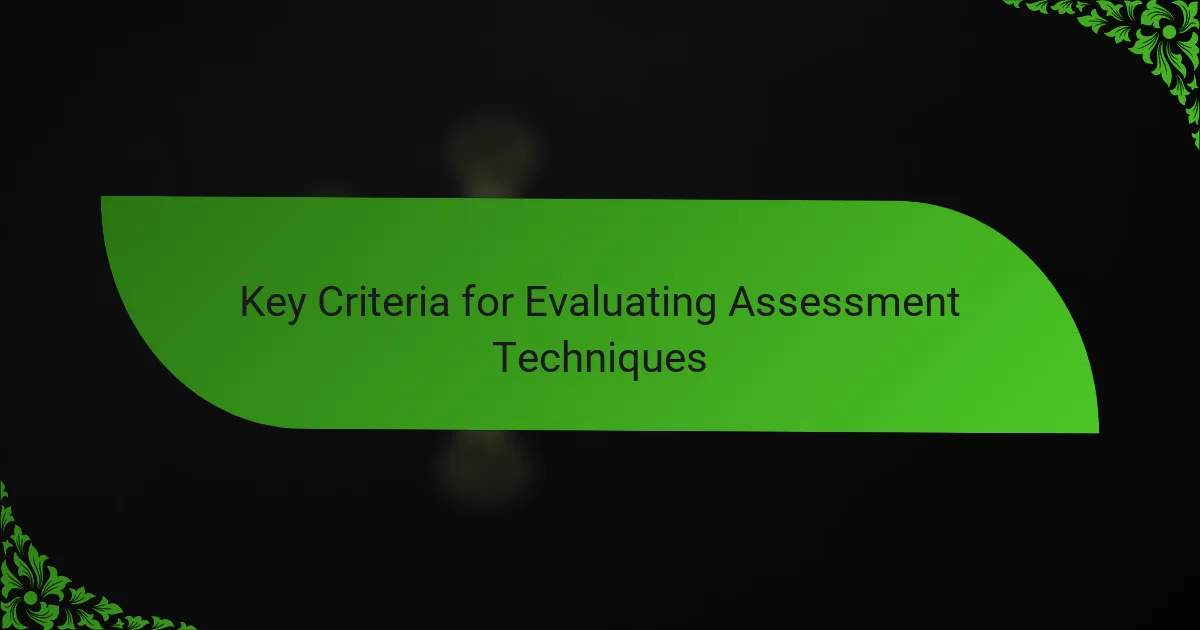
Key Criteria for Evaluating Assessment Techniques
When I evaluate assessment techniques, I always start by asking: Does this method genuinely reveal how a student thinks philosophically? For me, clarity of thought and reasoning takes precedence over rote memorization or formulaic answers. A good assessment should provide insights into a student’s ability to question, analyze, and argue.
Another key factor I consider is how well the method supports ongoing learning. Is the assessment an isolated event, or does it encourage students to reflect and improve continuously? From my experience, techniques like formative feedback work best because they create a conversation rather than a one-time judgment, fostering real growth over time.
Finally, I pay close attention to how fair and accessible the assessment is. Philosophy thrives on diverse perspectives, so assessments should not penalize unconventional thinking but instead embrace it. I always wonder, am I giving students a chance to express their unique reasoning without unnecessary barriers?
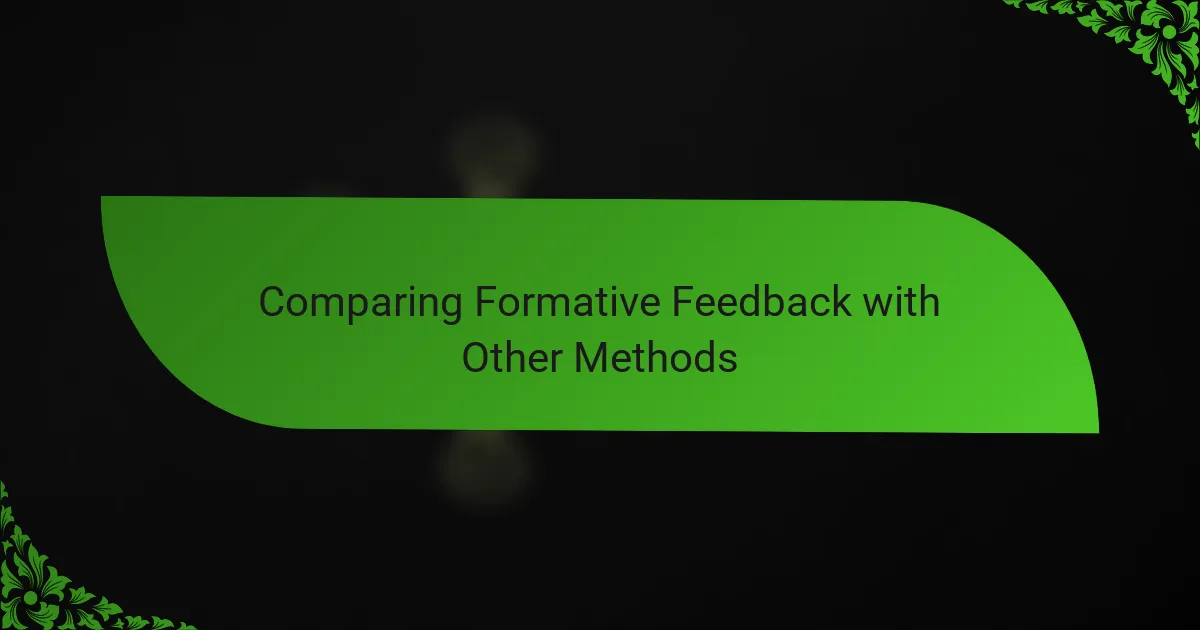
Comparing Formative Feedback with Other Methods
When I compare formative feedback to more traditional methods like standardized tests or summative essays, I often find the latter miss the subtlety of philosophical thinking. These conventional approaches can feel like snapshots frozen in time, revealing only a final conclusion rather than the rich process of reasoning that led there. Have you ever noticed how a single exam sometimes fails to capture a student’s evolving understanding or their struggle with complex ideas?
In contrast, formative feedback feels more like a continuous dialogue. From my experience, it invites students to revisit their assumptions and sharpen their arguments gradually. Unlike other methods, it doesn’t just assign a grade and move on; it encourages reflection, resilience, and genuine curiosity—qualities essential for philosophy but hard to measure in one-off assessments.
That said, I don’t dismiss other methods entirely. Summative assessments provide a necessary checkpoint, ensuring students meet certain standards. But if I were to prioritize, I’d say formative feedback offers a more nuanced and humane way to support philosophical growth, especially when the goal is to nurture thoughtful, independent thinkers rather than just test memorized content. Have you noticed how students respond differently when they see assessment as part of learning, not just judgment?
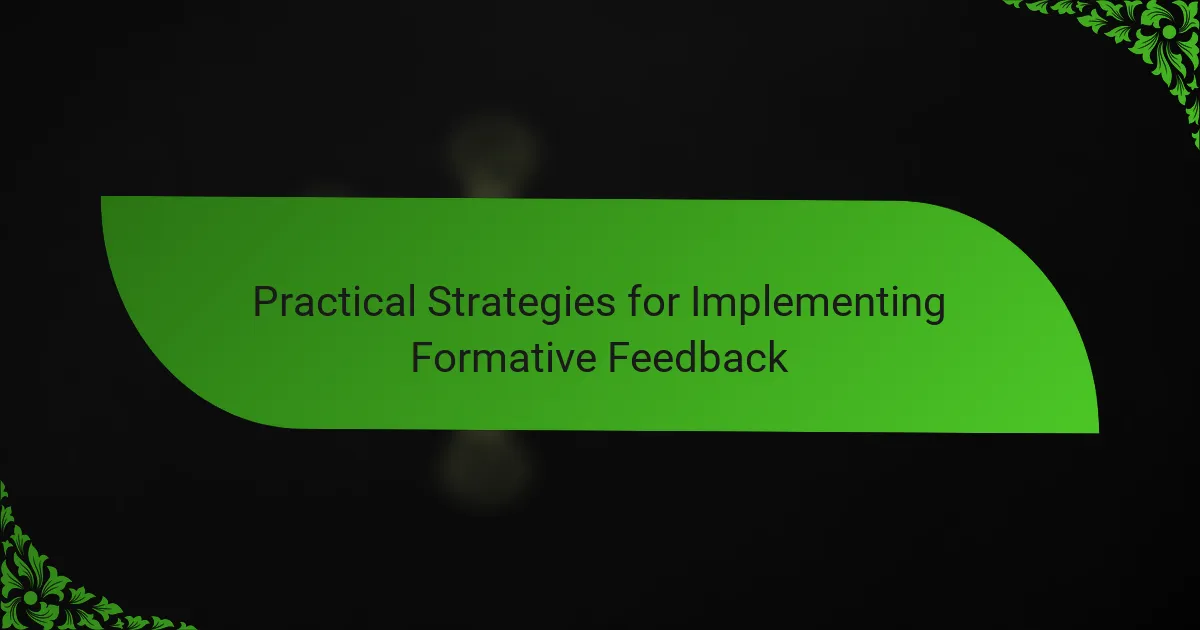
Practical Strategies for Implementing Formative Feedback
One practical approach I’ve found invaluable is scheduling regular, low-stakes opportunities for students to receive feedback. Instead of waiting until a major paper is due, I encourage quick reflections or brief argument drafts that I can respond to promptly. Have you ever seen how students’ confidence grows when they realize feedback is part of an ongoing conversation, not a final verdict?
Another strategy I rely on involves making feedback highly specific and actionable. Vague comments like “needs clarity” don’t help much; instead, I point out exact moments in their reasoning that could be tightened or expanded. From my experience, this clarity not only guides revisions but also teaches students how to self-assess, turning feedback into a tool for independence.
Finally, I try to create a classroom atmosphere where feedback feels collaborative rather than punitive. I often start class discussions by reflecting on my own philosophical missteps, modeling how we all learn through revision. Don’t you think learning becomes more meaningful when it’s okay to stumble and rethink? This mindset helps students engage deeply with formative feedback, making it a natural part of their philosophical journey.
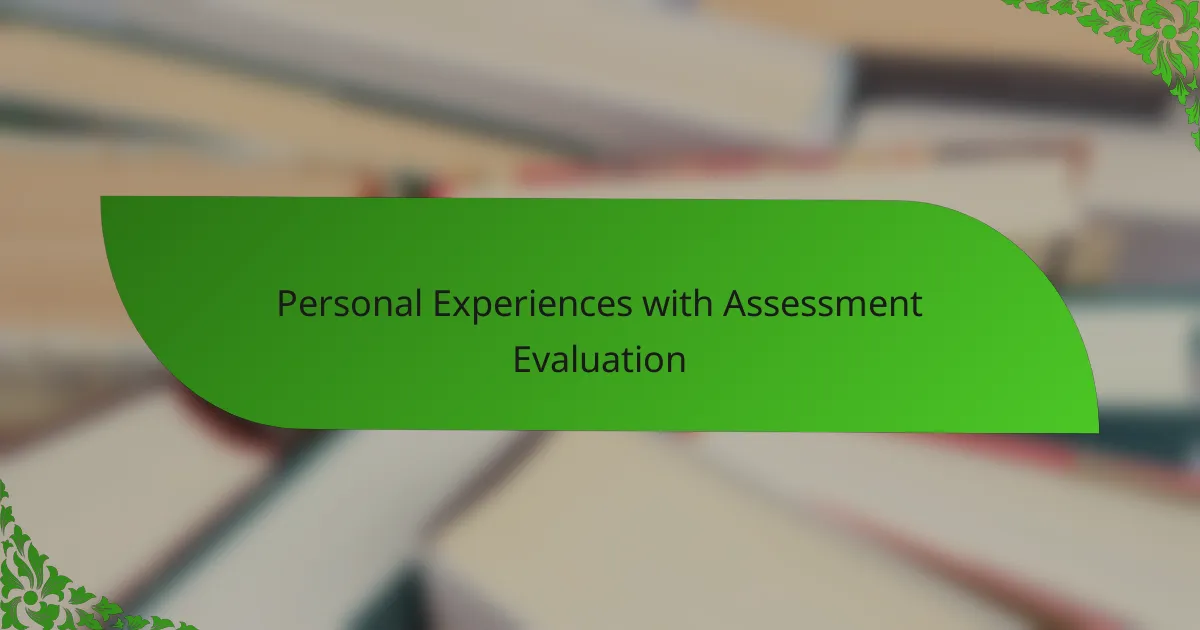
Personal Experiences with Assessment Evaluation
Reflecting on my own journey as an educator, I remember the times when I struggled to find assessment methods that truly captured my students’ philosophical reasoning. Early on, I relied heavily on essays, only to realize later that these didn’t always reveal the depth of their thinking or the evolution of their ideas. Have you ever graded a paper and wondered if you were just scratching the surface of a student’s understanding? That was a turning point for me.
I’ve also experienced moments when formative feedback transformed a student’s outlook entirely. I recall one student who initially felt overwhelmed by philosophy’s complexity, hesitant to share tentative ideas. But through continuous, thoughtful feedback, I witnessed a gradual blossoming of confidence and clarity in their arguments. Isn’t it amazing how small, consistent guidance can unlock potential that a single exam could never reveal?
These experiences have taught me that evaluating assessment methods isn’t just a technical exercise—it’s deeply personal and often emotional. It’s about recognizing the student behind the work and remembering that philosophy itself is a dialogue, not a monologue. Don’t we owe it to our students to create assessments that encourage that living conversation?
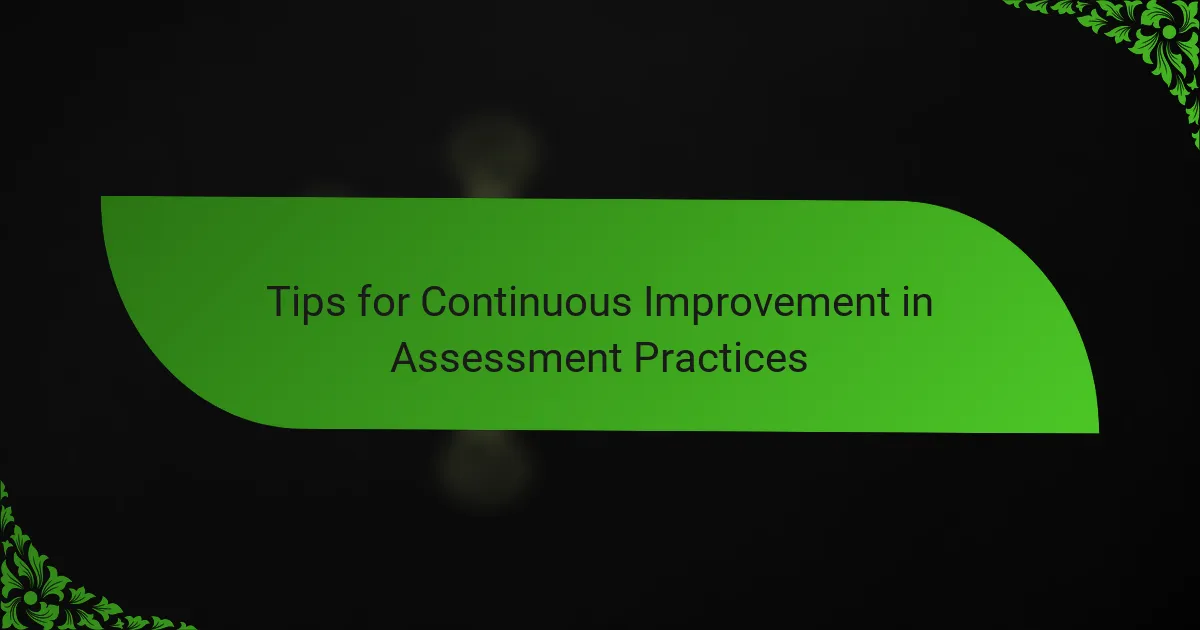
Tips for Continuous Improvement in Assessment Practices
One tip I can’t stress enough is the importance of regularly revisiting your assessment practices with fresh eyes. I’ve caught myself falling into routine, relying on the same feedback approach semester after semester, until I paused and asked: Is this really encouraging deeper thinking, or just checking a box? That moment of reflection sparked some of my most meaningful improvements.
Another strategy that has transformed my approach is gathering student input about assessments. Early in my career, I underestimated how valuable their perspectives are—until a student candidly shared how a particular feedback style left them confused rather than motivated. Since then, I make it a point to ask what’s working and what’s not, and adjusting based on that dialogue. Isn’t it remarkable how much you can learn when you listen closely?
Lastly, cultivating patience with the process itself is crucial. Philosophy isn’t about rushing to conclusions, and assessments shouldn’t be either. I remind myself that improvement comes through trial, error, and reflection—both for students and myself. When I embrace that mindset, I find assessments become less about grading and more about genuinely supporting growth. Have you ever noticed how slowing down actually speeds up learning?